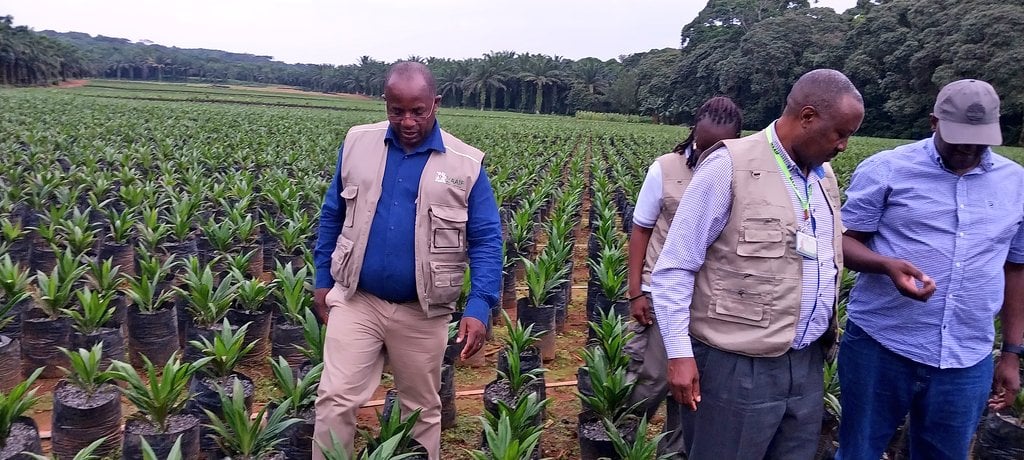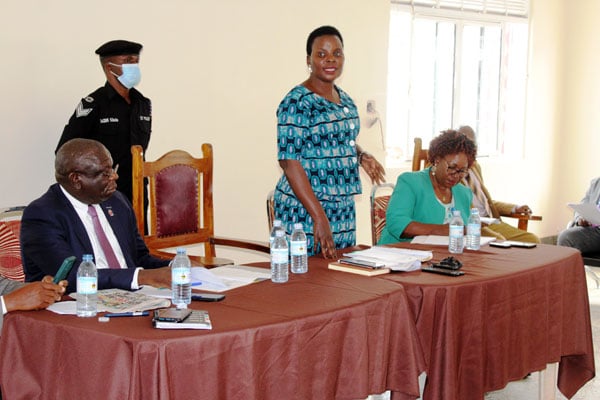Govt to plant 100,000 hectares of oil palm

The State Minister for Agriculture, Mr Fred Bwino Kyakulaga (left), Mr Fred Byantwale, the director of crop resources (centre), and other ministry officials inspect oil palm seedlings in Kalangala District on December 20, 2022. PHOTO /WILSON KUTAMBA
What you need to know:
- The country currently imports all its raw palm oil requirements from mostly Malaysia, but the government in 2021 introduced a Shs200 levy on each litre of cooking oil, and a 10 percent import duty on crude palm oil.
The government has unveiled a plan to plant at least 100,000 hectares of oil palm to meet the increasing demand for edible oils and also substitute imports.
The government is also targeting to increase the growth of sunflower, sesame, and soya beans.
“The government policy is to promote both palm and oil seeds. We want farmers to get involved on a large scale. Our target is to satisfy both immediate consumer demand and also have a robust domestic value chain,” the State Minister for Agriculture, Mr Fred Bwino Kyakulaga, said on Wednesday.
The minister was addressing a three-day stakeholders retreat in Kalangala District where staff from the Ministry of Agriculture, National Agricultural Research Organisation, National Agricultural Advisory Services, academic, and oil palm farmers representatives identified gaps to inform the national plan for the sector.
Mr Kyakulaga said they prefer oil palm compared to other oil seeds because it is 10 times more productive per unit area than any other crop.
“Naturally, oil palm has proven to be a model commodity for the achievement of the objectives of the agro-industrialisation programme,” he said.
Currently, Uganda can only produce 80,000 metric tonnes of edible oil annually against the current demand of 120,000 metric tonnes, but Mr Kyakulaga said they are eyeing 500,000 metric tonnes by 2025.
He said the government is currently negotiating with various banks to support industrial oil palm farmers who would like to grow bigger acreages beyond what the project is currently able to fund.
According to Mr Kyakulaga, once they hit their target (500,000 metric tonnes), the country will be able to have enough edible oil and other key ingredients needed in soap production.
“The current crisis where prices of edible oils and soap are through the roof has taught us a lesson. We don’t want to rely on other countries for crude oil yet we can produce ours in plenty,” he said.
The minister dismissed the notion that imported crude palm oil is cheaper than locally produced one.
“Six months ago, I asked someone in this sector to give me clear data on why imported crude oil is cheaper than the locally produced one so that we can get a solution as a government. This person has not reported back to me, but we shall get the truth,” he said.
The country currently imports all its raw palm oil requirements from mostly Malaysia, but the government in 2021 introduced a Shs200 levy on each litre of cooking oil, and a 10 percent import duty on crude palm oil.
He said besides Bidco, the government is in talks with other companies like Fruit Valley Ltd, Hillside Agriculture Ltd and Bukola Estate Ltd which have expressed interest to invest in oil products.
After registering success in Kalangala, the government now wants to replicate oil palm growing in other poverty-stricken communities in the districts of Mayuge, Masaka and Kyotera.
In Buvuma District, new oil palm plantations have already been set up with a target of planting 5,000 hectares in the next two years.
Crude palm oil prices hit a record high in May last year along with soybean oil, sunflower oil and other soft oils, which compete for a share in the vegetable oils market, affecting prices of several household products.
A bar of soap, which was at the beginning of the year sold at Shs3,500, now costs between Shs5,000 and Shs7,000 in major urban centres, while a litre of cooking oil increased from Shs5,000 to Shs10,000.





